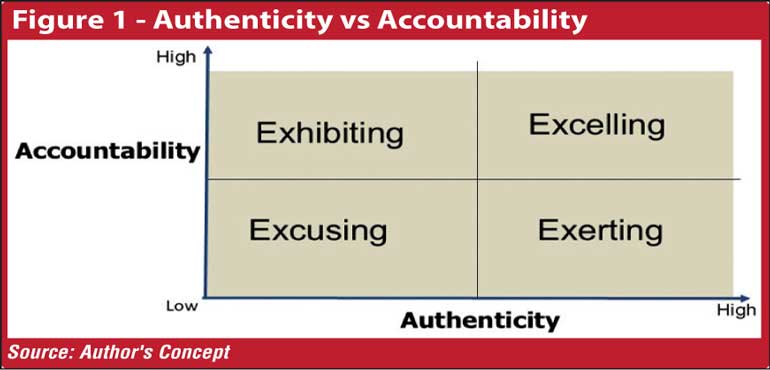Tuesday Feb 17, 2026
Tuesday Feb 17, 2026
Wednesday, 8 October 2025 00:24 - - {{hitsCtrl.values.hits}}


 Leadership is often misunderstood as positions and titles without referring to decisions and actions. One common complaint around the globe is that the so-called leaders give lame excuses to avoid accountability of their own actions. It also shows the need for authenticity in required actions. It may be true not only for political leaders but of leaders representing all walks of life. Today’s column reflects on leadership lessons associated with authenticity and accountability.
Leadership is often misunderstood as positions and titles without referring to decisions and actions. One common complaint around the globe is that the so-called leaders give lame excuses to avoid accountability of their own actions. It also shows the need for authenticity in required actions. It may be true not only for political leaders but of leaders representing all walks of life. Today’s column reflects on leadership lessons associated with authenticity and accountability.
Overview
Authenticity refers to being genuine in showing the real you. When applied to leadership, it involves acting with sincerity, integrity, and transparency. It also includes practicing of one’s core values in setting an example to his/her team members. Authentic leaders emphasise ethicality in inspiring, influencing and initiating. They are high in demand in a world where principles are compromised for privileges.
Steve Jobs was frank about his failures. Oprah Winfrey used to openly share her past struggles during her interactions with others. Jacinda Ardern, the former prime minster of New Zealand was known for showing her empathy and effectiveness together. Satya Nadella strived to transform Microsoft’s culture from “know it all” to “learn it all.” These all represent authentic leaders by one way or the other.
“Authenticity is when you say and do the things you actually believe. But if you do not know WHY the organisation or the products exist on a level beyond WHAT you do, then it is impossible to know if the things you say or do are consistent with your WHY. Without WHY, any attempt at authenticity will almost always be inauthentic.” This is how Simon Sinek advocated in his popular book, “Start with Why.”
Accountability simply means that one is answerable to what you do. In a broader sense, it is the acknowledgment by an individual or an institution of the answerability of one’s actions. Often confusingly interchanged, it is different to responsibility or responsibilities. As we learn in the fundamentals of management, responsibilities can be delegated to others, but the accountability cannot be delegated. I remember once reporting to an elderly leader who had a framed tag hung on the wall behind his table with an interesting saying. “The buck ends here.”
“Accountability breeds response-ability,” so said Stephen Covey. It highlights the capability to handle issues in taking ownership. Accountability creates a clear expectation for outcomes, motivating teams to meet high standards and work towards shared goals. A lack of accountability can lead to employees doing the bare minimum instead of their best effort. Jason Kelce, a US football player expressed it elegantly. “I think as a leader, you just take accountability. That is what leadership is. Leadership is taking accountability yourself and holding others to the same standard, regardless of what is going on.”
Authenticity vs. Accountability
It is interesting to infer the interplay between authenticity and accountability with leadership in mind. Figure 1 is an attempt to do so, highlighting four possible scenarios.
Let us examine the four Es as given in the figure showing the combinations of accountability and authenticity.
Excusing
One may excuse to show results with low level of authenticity and accountability. We have many such examples in Sri Lanka. Rather than striving to achieve given targets despite obstacles, many will find excuses of passing the blame to others. It may be due to lack of competence and confidence both. Many politicians of yesteryear were famous for doing these and the voters, I am sure the voters gave them the deserving treatment at the elections.
In the corporate world too, such people are common. In “passing the buck,” they have a whole heap of excuses to show how innocent and genuine they are. Blame games of this nature lead to escalation of organisational politics resulting in fragmentation, frustration, and eventual failure.
Exhibiting
This is one-way bias scenario where one shows the world of one’s desire to be accountable but without genuinely interested in it. It is more of a showing than sincerely doing. Some bosses who want to be popular among their teams, may openly make utterances to energise them, without seriously meaning them. We have such people among Sri Lankan community as well. The real shrewdness of such leaders is to convince their team members of their so-called keenness to ensure the wellbeing of the team and limit it only to the words.
In the corporate sector, the façade some wear by way of flowery slogans and flattery statements would demonstrate the absence of authenticity. They may deceive some for some time but not all in all times. Such so called leaders will be exposed eventually with evidence so that the true nature of them will be seen with surprise by many who followed them.
Exerting
In this scenario, the leader is sincerely struggling to accept the ownership of the outcomes, mostly negative. Because of the authenticity, the effort is there, yet the challenge of facing failures as “fertilisers for future” is much less visible.
It can also be a case of having the attitude of being genuine yet not willing to be answerable for results. It is a subtle rejection of the ownership of one’s own actions may be individual or collective, paving the way for a possible avoidance. A manager who is known to demonstrate a high degree of integrity yet has not achieved the given targets as a team could be one example.
Excelling
This is obviously the preferred scenario, the much respected one. Great leaders in the annals of human history have shown excellence in being both authentic and accountable. Mahatma Gandhi is a fitting example of demonstrating such excellence. His non-violent path towards freedom showing ample evidence of authenticity and accountability.
In the corporate world, the leaders who also are “leader-breeders” achieve results against odds in exceeding stakeholder expectations, together with a committed and a competent team demonstrate excellence in action. This is the rare breed in high demand, who can be role-models to many aspirant leaders.
Akio Morita as a case in point
In perusing through the annals of managerial leadership history, Akio Morita emerges as a fitting figure who excelled as a leader showing both authenticity and accountability. His leadership style combined “Japanese spirit” with “western learning.” He known for his visionary innovation, willingness to take calculated risks, and for fostering an employee-centric culture at Sony.
“Nobody openly laughed at me… Everybody gave me a hard time. It seemed as though nobody liked the idea… I do not believe that any amount of market research could have told us that the Sony Walkman would be successful.” That is how Morita reflected on his authentic actions, struggling at times with eventual success.
“Sony” was started in 1946 as an electronics shop by Masaru Ibuka with 8 employees, just as Japan was starting to rebuild itself after World War II. The company name Tokyo Tsushin Kogyo (Tokyo Telecommunications Engineering Corporation or TTK) was quickly established when Akio Morita joined Masaru Ibuka that same year. It was not until 1958 until the company changed their name to Sony, which sounded a bit like “sonus” (Latin for noise or sound) as well as being a word unused around the world. In fact, Sony was the first company to list on an American stock exchange – the NYSE, which was a big deal for the company at the time.
Under Morita’s stewardship, Sony not only achieved unparalleled growth but also introduced a slew of groundbreaking products that revolutionised the electronics landscape. His leadership style, characterised by a blend of intuition, risk-taking, and employee empowerment, became the bedrock of Sony’s corporate culture.
Morita’s emphasis on fostering a culture of innovation and his unwavering belief in the potential of his employees played a pivotal role in Sony’s meteoric rise. His legacy continues to inspire leaders across the globe, emphasising the importance of visionary leadership in business success.
Being accountable when authenticity was challenged
In 1955, Bulova, a well-known American brand, sought to purchase 100,000 units of Sony’s innovative pocket-sized transistor radios. They had put forward one condition: no Sony name, branded as Bulouva. “Nobody in the country knows Sony! We could not sell anything under that name. But everyone in America knows our name. Isn’t it ridiculous not to utilise our established reputation?” That was how they argued.
Morita’s response was interesting. “Fifty years ago, how many people knew your name? This is the first year of my company’s fifty years history. If we do not use our name, we may not have a history.” Even though the deal was worth a significant portion of Sony’s capital and the blessings of his team was for it, Akio Morita said no.
It is amazing to see how his authenticity and accountability as a leader were aptly demonstrated. What Morita believed was to establish Sony’s reputation for quality and decided to find a distributor who would sell the product under the Sony brand, a decision that helped transform “Made in Japan” from a mark of cheap goods to one of quality and reliability.
Way forward
“The journey to authentic leadership begins with understanding the story of your life. Your life story provides the context for your experiences, and through it, you can find the inspiration to make an impact in the world.” That is how Bill George advocates in his book titled “Discovering Your Authentic Leadership.” No more stressing is needed to emphasise the leadership excellence with authenticity and accountability in action. Sri Lankan managers and administrators alike can perform a lot better in this acute respect.
(The writer, a Senior Professor in Management, and an Independent Non-executive Director, can be reached at [email protected], [email protected] or www.ajanthadharmasiri.info.)